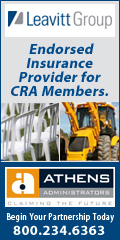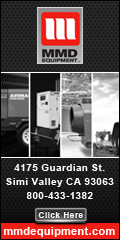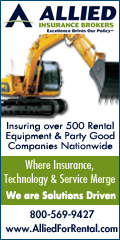
| April 2014 | Past Issues/Subscribe | Printer-Friendly | Advertise |
UPCOMING EVENTS
April 15–16, 2014  April 30, 2014 April 30, 2014Greater LA Orange & Inland Joint Territory Meeting hosted by Mulitquip - Carson, CA more... CRA Board of Directors Meeting - Lake Tahoe, CA
July 17–21, 2014
CRA RV Campout - Lake Tahoe, CA more...
 January 26-28, 2015 January 26-28, 2015CRA Rental Rally
Las Vegas, NV VENDOR NEWS
 Marking the 60th anniversary of the invention of the backhoe loader by Mr. JCB, the company that bears his initials introduced the world’s most productive, efficient, powerful and comfortable backhoe loader available – the 3CX-14 Backhoe Loader – at the ARA show in February. JCB’s innovative solution to Tier 4 final emissions legislation was on display in the newly released machine designed specifically for the rental industry. JCB has met the legislation through the use of innovative in-cylinder technologies (patent pending) resulting in a cleaner, more efficient combustion process. This has eliminated the need for any external exhaust after-treatment, meaning no diesel particulate filter (DPF) or additives such as Ad-Blue, significantly reducing operating costs. Marking the 60th anniversary of the invention of the backhoe loader by Mr. JCB, the company that bears his initials introduced the world’s most productive, efficient, powerful and comfortable backhoe loader available – the 3CX-14 Backhoe Loader – at the ARA show in February. JCB’s innovative solution to Tier 4 final emissions legislation was on display in the newly released machine designed specifically for the rental industry. JCB has met the legislation through the use of innovative in-cylinder technologies (patent pending) resulting in a cleaner, more efficient combustion process. This has eliminated the need for any external exhaust after-treatment, meaning no diesel particulate filter (DPF) or additives such as Ad-Blue, significantly reducing operating costs.
Learn More...  The new Brushcat™ rotary cutter attachments from Bobcat Company provide excellent cutting performance, durable components and several safety features. These attachments are designed to help compact equipment operators cut overgrown grass, brush and small trees. They transform undergrowth into mulch. Ideal for clearing trails, pastures or new construction sites, the new Bobcat® rotary cutters have a shortened deck for improved visibility. The oscillating deck enables the attachment to follow the ground surface, and the dual-blade design reduces the overall weight. With a shorter deck than competitors, the Brushcat rotary cutter has a tighter turning radius and is easier to fit and load on trailers. The new Brushcat™ rotary cutter attachments from Bobcat Company provide excellent cutting performance, durable components and several safety features. These attachments are designed to help compact equipment operators cut overgrown grass, brush and small trees. They transform undergrowth into mulch. Ideal for clearing trails, pastures or new construction sites, the new Bobcat® rotary cutters have a shortened deck for improved visibility. The oscillating deck enables the attachment to follow the ground surface, and the dual-blade design reduces the overall weight. With a shorter deck than competitors, the Brushcat rotary cutter has a tighter turning radius and is easier to fit and load on trailers.
Learn More...  April is National Safe Digging Month and John Deere is a proud sponsor of the Common Ground Alliance and their efforts to raise awareness of 811 and promote safe digging. Though awareness and use of 811 has significantly decreased the number of underground utility strikes in the U.S., the fact that there are still fatalities and damages from hitting gas and utility lines underscores the need for a continued safety campaign. April is National Safe Digging Month and John Deere is a proud sponsor of the Common Ground Alliance and their efforts to raise awareness of 811 and promote safe digging. Though awareness and use of 811 has significantly decreased the number of underground utility strikes in the U.S., the fact that there are still fatalities and damages from hitting gas and utility lines underscores the need for a continued safety campaign.
Learn More...  Multiquip Inc., the industry’s premier manufacturer of concrete and plaster/mortar mixers, introduces an mobile app enabling contractors, equipment professionals and homeowners to choose the exact mixer to meet their project requirements. Once installed, the user inputs their basic project requirements such as the number of blocks to be placed for mortar mixers or slab dimensions for concrete mixers. The Mixer Sizing App analyzes the data and provides an estimated amount of material needed (in cubic feet and standard bag sizes) for the job and shows available mixer sizes and power options within the MQ/Whiteman and MQ/Essick model ranges. Multiquip Inc., the industry’s premier manufacturer of concrete and plaster/mortar mixers, introduces an mobile app enabling contractors, equipment professionals and homeowners to choose the exact mixer to meet their project requirements. Once installed, the user inputs their basic project requirements such as the number of blocks to be placed for mortar mixers or slab dimensions for concrete mixers. The Mixer Sizing App analyzes the data and provides an estimated amount of material needed (in cubic feet and standard bag sizes) for the job and shows available mixer sizes and power options within the MQ/Whiteman and MQ/Essick model ranges.
Learn More...  In spite of difficult market conditions, Munich-based light and compact construction equipment manufacturer Wacker Neuson managed to further increase Group revenue and profitability in 2013. Having reached its targets for 2013, Wacker Neuson now aims to remain on this growth path through 2014. In spite of difficult market conditions, Munich-based light and compact construction equipment manufacturer Wacker Neuson managed to further increase Group revenue and profitability in 2013. Having reached its targets for 2013, Wacker Neuson now aims to remain on this growth path through 2014.
Learn More... BUSINESS NEWS
The California Chamber of Commerce and a number of other groups have formed a coalition to educate the public and correct misinformation about proven, safe oil extraction technologies. "Continued, safe domestic oil production is critical to our state’s energy independence and our economy. Currently 40% of our state’s petroleum energy needs are met with domestic supplies and our population is growing. Hydraulic fracturing has been safely used to extract domestic oil in California for more than 60 years," said CalChamber President and CEO Allan Zaremberg.
Learn More... The California Chamber of Commerce recently released its annual list of "job killer" bills, calling attention to the negative impact that 27 proposed measures would have on California’s job climate and economic recovery if they were to become law. "The economic recovery is still the number one issue for Californians," said CalChamber President and CEO Allan Zaremberg. "These bills pose a serious threat to our economy and, if enacted, would dampen job growth in the state. While it is encouraging that the list of new job killer bills is smaller than in past years, the unfortunate consequence of any one of these bills becoming law would be harmful to our economy. Protection of the job climate remains CalChamber’s top priority."
Learn More... The California Chamber of Commerce recently released a list of 27 proposed "Job Killer" bills that could hurt California’s jobs climate. One of the measures on the list, Senate Bill 1017 (Evans), would triple existing oil taxes and could drive up gas prices as well as the costs of other goods and services.
Learn More... In the April 2014 Short-Term Energy Outlook (STEO), the U.S. Energy Information Administration (EIA) projects that regular-grade gasoline retail prices will average $3.57 per gallon during the current summer (April through September) driving season, similar to the $3.58/gal average of summer 2013. After rising into May, the retail price is expected to fall through the remainder of the summer because both crude oil prices and gasoline crack spreads (the difference between wholesale product price and the price of crude oil) decline. Daily and weekly national average prices can differ significantly from monthly and seasonal averages, and there are also significant regional differences, with prices in some areas exceeding the national average by 25 cents/gal or more.
Learn More... Joel Fox, editor of Fox & Hounds and president of the Small Business Action Committee, commented on the proposal of an oil severance tax for California in a recent article on foxandhoundsdaily.com. He states, "In promoting an oil severance tax in California, proponents often cite the fact that other oil-producing states have such a tax. However, what is not often acknowledged is who pays that tax." Fox states that it can be argued that the tax in some of those oil severance tax states is ultimately paid in part by California consumers.
Learn More... CARB
The California Air Resources Board recently unveiled proposed amendments to its Truck and Bus Regulation. The amendments are designed to provide new flexibility to truckers working to clean up their aging diesel fleets while still protecting the important emission benefits the regulation provides. Board members will consider the changes at the April 24 hearing. The proposed changes were developed after some stakeholders voiced concerns regarding their ability to comply with the regulation at the October 2013 Board hearing. Truckers were able to expand on these concerns at five ARB-sponsored public workshops held across the state in December.
Learn More... The regulation requires diesel trucks and buses that operate in California to be upgraded to reduce emissions. Heavier trucks must be retrofitted with particulate matter (PM) filters beginning January 1, 2012, and older trucks must be replaced starting January 1, 2015. By January 1, 2023, nearly all trucks and buses will need to have 2010 model year engines or equivalent.
What's New (March 7, 2014): Amendments to the Truck and Bus Regulation Planned for April 2014 The Air Resources Board will conduct a public meeting on April 24, 2014 in Sacramento to discuss proposed amendments to the regulation. A brief summary of the proposed changes and information about the rulemaking are available. Learn More... The ARB's Heavy-Duty Vehicle Inspection Program and Periodic Smoke Inspection Program were adopted into law in 1988 to control excessive smoke emissions and tampering from heavy-duty diesel trucks and buses. The regulations Title 13 CCR, sections 2180-2189 for HDVIP and Title 13 CCR, sections 2190-2194 for PSIP, which govern these programs, were last amended in 2013.
The HDVIP program requires heavy-duty trucks and buses to be inspected for excessive smoke and tampering and for engine certification label compliance. Any heavy-duty vehicle traveling in California, including vehicles registered in other states and foreign countries, may be tested. Tests are performed by ARB inspection teams at border crossings, CHP weigh stations, fleet facilities and randomly selected roadside locations. Owners of trucks and buses found in violation are subject to minimum penalties starting at $300 per violation. Learn More... The Truck and Bus Regulation will reduce diesel exhaust emissions from privately owned and federal government diesel trucks and buses. Privately and publicly owned school buses have different requirements and do not need to be reported. This CARB site has the Truck Regulations Upload and Compliance Reporting System (TRUCRS).
Who Needs to Report for 2014? Compliance requirements are currently in effect for heavier vehicles with a GVWR greater than 26,000 lbs. with engine years 1996 or newer. To assist vehicle owners with the transition to the January 1, 2014 particulate matter (PM) filter compliance deadline, the Air Resources Board (ARB or Board) is taking specific actions to provide additional time for owners to complete their good-faith compliance efforts and to take advantage of additional flexibility for many lower-use vehicles and vehicles that operate solely in certain areas of the state as explained in the regulatory advisory MSC 13-28. Owners will have the opportunity to use the following options under certain conditions but must report by January 31, 2014. Learn More... All diesel-fueled trucks, buses, trailers and transportation refrigeration units operating in California, including those based out of state, have requirements to reduce air pollution and improve the state's overall air quality.
See the new 2014 Reporting Guide! The Truck Regulation Upload, Compliance, and Reporting System (TRUCRS) and the Online Reporting Guide were recently updated. Also, see more information for: Course #521: How to Comply with the Truck and Bus Regulation. Learn More... On July 26, 2007, the Air Resources Board (ARB) adopted a regulation to reduce diesel particulate matter (PM) and oxides of nitrogen (NOx) emissions from in-use (existing) off-road heavy-duty diesel vehicles in California.
What's New? (Posted March 18, 2014) Fleet Average Calculator for Large Fleets has been updated and expanded. The fleet average calculator for large fleets has been expanded to include all compliance years out to January 1, 2023, and is available at the link below. The calculator has also been updated with additional features to better aid large fleet owners in planning out their compliance strategies. For more information, please call the diesel vehicle information hotline at (866) 6-DIESEL or (866) 634-3735. Learn More... Owners or Operators of portable engines and certain other types of equipment can register their units under the Air Resources Board's (ARB) Statewide Portable Equipment Registration Program (PERP) in order to operate their equipment throughout California without having to obtain individual permits from local air districts.
Portable Diesel Engine Airborne Toxic Control Measure On January 1, 2013, the Portable Engine Airborne Toxic Control Measure (ATCM) fleet emission standards went into effect. The ATCM required owners of portable engines to submit a Fleet Compliance Report to the Air Resources Board by March 1, 2013. The next Fleet Compliance Report will be due March 1, 2017. Changes to Fleets The ATCM also requires owners to ensure the average PM emission level for their fleet does not fall out of compliance due to changes in the fleet. Owners of portable diesel engine fleets who are adding or removing engines are strongly encouraged to re-calculate their fleet average. Other changes, such as modifying a registration to be low-use or emergency only-use can also affect the fleet emissions average. We recommended that once you have completed the calculator, save it and update it any time your portable fleet changes. Diesel engine owners submitting applications for PERP registration for the first time must include a Fleet Compliance Report. This includes transfer of existing registrations for engines you have purchased. Critical Engine Requirements: June 30, 2014: This is the last day ARB will accept initial registration applications for Interim Tier 4 engines rated from 175 bhp to 750 bhp. Effective July 1, 2014: For initial registration into PERP, all diesel engines must meet the following certification tier levels: 50 to 74 bhp - Final Tier 4 75 to 174 bhp - Interim Tier 4 175 to 750 bhp - Final Tier 4 Over 750 bhp - Interim Tier 4 Or, for all power categories - Flex engines certified under the flexibility provisions of Federal 40 CFR 1039.625, or CFR 89.102, or California Code of Regulations section 2423 (d). Learn More... This area of the Off-Road Mobile Sources website pertains to off-road large spark-ignition (LSI) equipment greater than 25 horsepower, including farm, construction and industrial equipment, powered by gasoline and liquefied petroleum gas (LPG) and other alternate fuels. Typical applications that use LSI engines include forklifts, specialty vehicles, airport service vehicles, large turf care equipment, portable generators and a wide array of other agricultural, construction and general industrial equipment. The U.S. EPA has sole authority to control new farm and construction equipment under 175 horsepower.
Learn More... The small off-road engine (SORE) category consists of off-road spark-ignition engines below 25 horsepower, including small utility equipment, lawn mowers and weed trimmers. This category does not include compression-ignition engines, watercraft or recreational vehicles. The following includes general information regarding small off-road engines and ARB's SORE program:
Small Off-Road Engines Fact Sheet; and Certification Guidelines - Online access to relevant certification documents for manufacturers. Learn More... In December 2011 major amendments to the Off-Road Diesel Vehicle Regulation, which include delaying the first compliance date to no earlier than January 1, 2014, became effective. The changes to the regulation are reflected in the fact sheets, advisories and answers to frequently asked questions available on the Knowledge Center for the Off-Road Diesel Vehicle Regulation web page.
Learn More...  Driving Toward a Cleaner California (DTCC) is a coalition of owner-operators, farmers, construction contractors and other business and community leaders committed to working with the California Air Resources Board (CARB) to craft a sensible truck and bus replacement rule that both cleans the air and keeps California's economy moving forward. However, we have to apologize -- with a high volume of news, we have been overwhelmed with keeping up with the latest industry news. Our staff will be working on getting you the latest updates. In the meantime, you may also visit our sister affiliate site for the latest news from CARB, AB32, and any related news to the industry. Click on "Learn More" to access this site. Driving Toward a Cleaner California (DTCC) is a coalition of owner-operators, farmers, construction contractors and other business and community leaders committed to working with the California Air Resources Board (CARB) to craft a sensible truck and bus replacement rule that both cleans the air and keeps California's economy moving forward. However, we have to apologize -- with a high volume of news, we have been overwhelmed with keeping up with the latest industry news. Our staff will be working on getting you the latest updates. In the meantime, you may also visit our sister affiliate site for the latest news from CARB, AB32, and any related news to the industry. Click on "Learn More" to access this site.
Learn More... |

| calrental.org |



